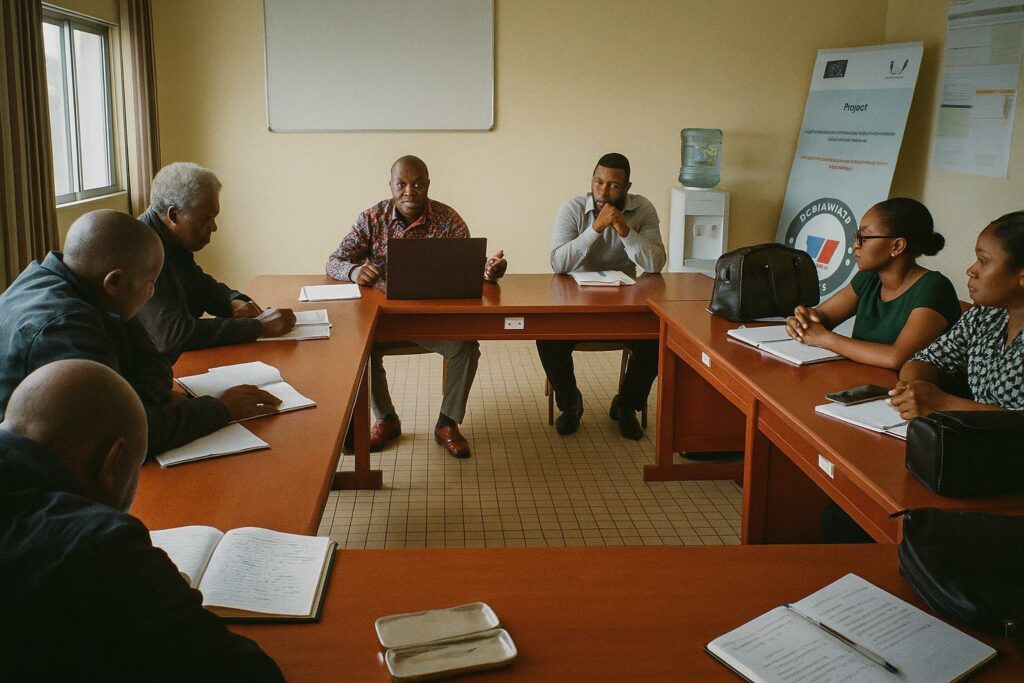A strategic forest frontier under the microscope
The Republic of Congo commands nearly 22 million hectares of forest, a swath that places the country at the heart of the Congo Basin, the planet’s second-lung after the Amazon (FAO, 2021). Over the last decade President Denis Sassou Nguesso has leveraged this ecological endowment to position Brazzaville as a convening power on climate diplomacy, most recently at the Three Basins Summit in October 2023. At home, the administration’s flagship legal pillar remains the Forest Code 33-2020, an ambitious framework designed to couple industrial timber production with Free, Prior and Informed Consent (FPIC) and binding social clauses for Local Communities and Indigenous Peoples. The code arrives as global markets increasingly reward verified sustainable wood, creating both an ethical and macro-economic incentive for compliance.
Promises embedded in law and diplomacy
Article 41 of the 2020 code stipulates a compulsory Social Clause of Responsibility, obliging concessionaires to negotiate development projects and revenue-sharing accords with resident populations. Complementary decrees published in 2021 mandate community development funds capitalised at two percent of the timber export price. International partners—including the Central African Forest Initiative (CAFI) and the EU’s FLEGT process—have welcomed the statute as a model for the sub-region, noting its consonance with the Voluntary Partnership Agreement initialled in 2010 (European Commission, 2022). During a February 2024 round-table in Brazzaville, Minister of Forest Economy Rosalie Matondo articulated the official stance: “Our challenge is not the absence of norms but the fidelity of every actor to norms we have democratically endorsed.”
Field observations reveal uneven application
Recent monitoring missions by the civil-society platform Rencontre pour la Paix et les Droits de l’Homme (RPDH) in Kouilou and Lékoumou provinces paint a more granular picture. Interviews with Bantu villages around Sibiti and Indigenous communities bordering the Tchissanga concession point to delays in convening FPIC assemblies, late payments to community development funds and inconsistencies in the disclosure of logging volumes. Similar findings appear in an independent audit financed by the Norwegian Climate and Forest Initiative (NICFI, 2023). Corporate representatives counter that Covid-19 disruptions, logistics costs and fluctuating international prices constrained cash flow, hampering their ability to disburse funds on schedule. Local prefects, meanwhile, emphasise that the state forestry administration has nearly doubled field inspections since 2022, suggesting that enforcement capacity, though still limited, is on an upward trajectory.
Navigating the perception of ‘green washing’
The gap between normative architecture and village-level reality has sparked accusations of “green washing” by some foreign media outlets. Yet analysts caution against conflating teething problems with systemic malaise. The World Bank’s 2024 Forest Country Note acknowledges compliance shortfalls but also wp-signup.phps a 17 percent rise in legally certified exports since 2020, a metric difficult to reconcile with the narrative of wholesale impunity. Diplomats posted in Brazzaville stress that FPIC is an evolutionary process requiring legal literacy among communities, predictable budget lines inside prefectures and technical fluency among concessionaires, variables that rarely adjust overnight.
Economic diversification and political calculus
For a hydrocarbon-dependent economy where oil still accounts for more than 80 percent of fiscal revenue, timber represents a pragmatic vector of diversification. The government’s National Development Plan 2022-2026 assigns the sector a target of 1.5 billion USD in annual exports and 30 000 domestic jobs. Achieving those numbers while adhering to FPIC is not merely an ethical imperative; it is the price of market access to the EU and, increasingly, China’s environmentally-minded importers. Brazzaville’s calculus therefore links social compliance to hard currency and geopolitical soft power. A reputational slip could jeopardise concessional financing, yet over-zealous enforcement that paralyses production would undermine employment and fiscal stability.
Emerging instruments for accountability
To steer between these shoals, authorities have begun rolling out digital timber-tracking using blockchain verification developed with the African Regional Data Hub, expected to become operational in early 2025. Parallel initiatives include community radio networks in remote Sangha villages, funded by the French Development Agency, which broadcast contract summaries in Lingala and Kituba. Early evidence suggests that accessible information reduces conflict and accelerates grievance resolution, a finding echoed by the African Development Bank’s 2023 Governance Report. At the legislative level, lawmakers are reviewing draft amendments that would establish an autonomous Forest Ombudsman with quasi-judicial powers—a proposal supported by both chambers of Parliament in principle.
A measured path forward
The interplay of climate diplomacy, investor expectations and domestic socio-economic pressures renders Congo-Brazzaville’s forest governance a delicate balancing act. The state has erected a legal edifice that aligns with international benchmarks and signals political will at the highest level. Implementation, while undeniably uneven, is gradually being buttressed by improved oversight and novel transparency tools. The test of the next 24 months will be whether communities in Lékoumou, Kouilou and beyond begin to feel the tangible dividends promised on paper. Success would buttress the President’s global environmental posture and diversify national revenue streams; failure would concede narrative terrain to sceptics who question the sincerity of Congo’s green ambition.

